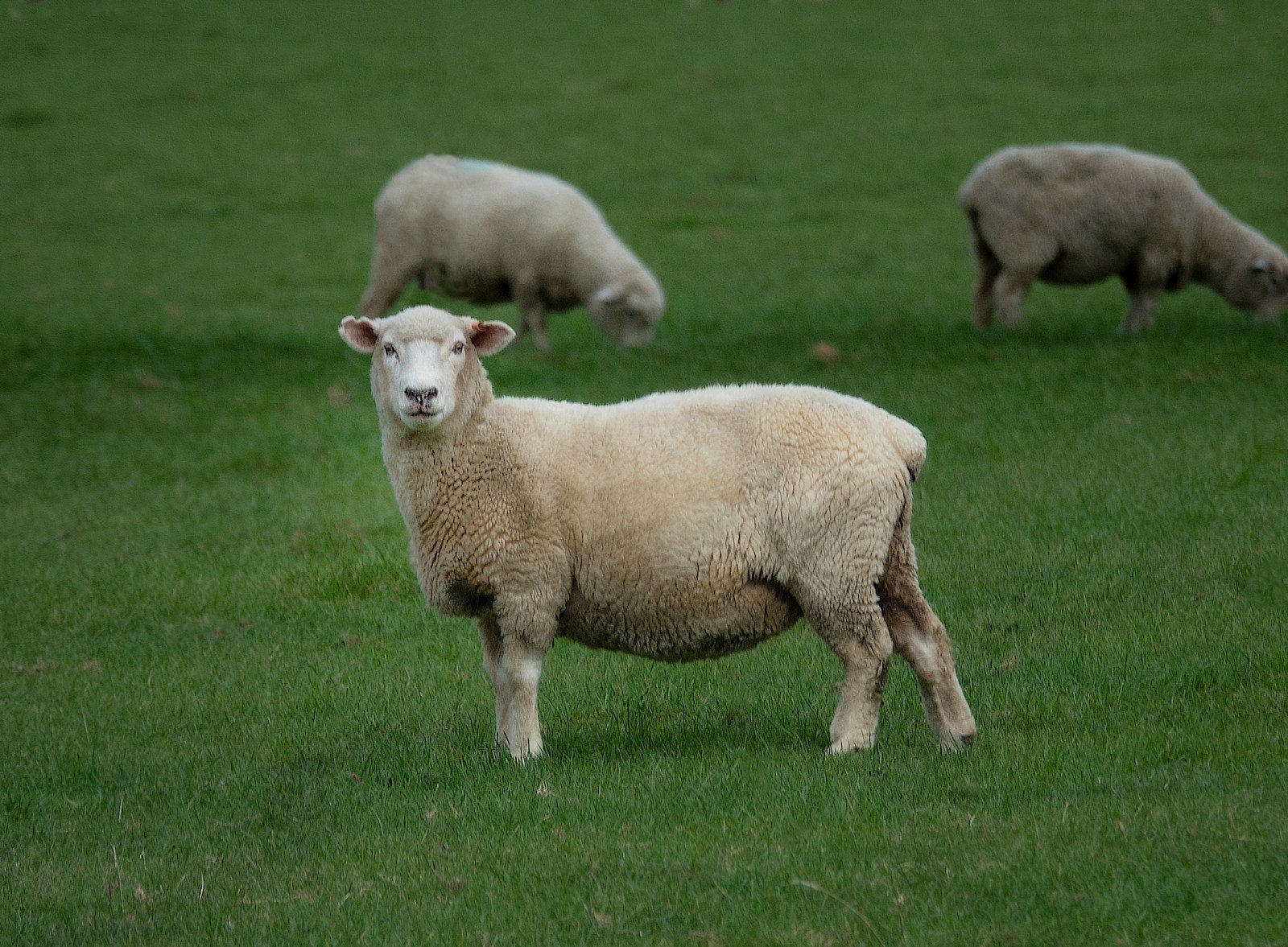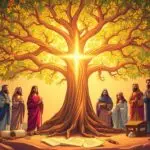“I am the good shepherd. The good shepherd lays down his life for the sheep.” – John 10:11
What does sheep symbolize in the Bible? In the Bible, sheep have deep meaning. They stand for faith, people’s vulnerability, and God’s care. In the past, they were often used for holy acts, showing their importance from early times.
Being a shepherd was seen as simple work back then. But in the Bible, it means guiding and protecting people. Just like sheep only have their shepherd for safety, we too rely on God’s guidance and care.
Sheep tend to follow without questioning, much like people who sometimes go the wrong way. Jesus is the ultimate guide, lovingly leading us back to God. He is known as the “Lamb of God,” offering us redemption and life forever.
Sheep know their shepherd’s voice. Likewise, we are told to listen to God. Sheep also form tight bonds with their flock, just as we should stay loyal and supportive of each other.
The Bible often uses sheep to show our deep need for God’s love and care. It teaches us that God takes our worries and heals our hurts. He offers us comfort and renewal.
For centuries, sheep have been important in both culture and faith. They show us Jesus’ loving sacrifice and how we should care for others. Let’s learn from the rich meaning of sheep in the Bible.
Significance of Sheep in the Bible
Sheep were very important to the ancient Hebrews and others. They provided food and money. More than that, they carried deep meaning in the Bible. They often stood for God’s people, showing how they need a guide.
“He will separate the people one from another as a shepherd separates the sheep from the goats.” – Matthew 25:32
Matthew 25:32 has a parable where the sheep are believers in Jesus. The goats are those who don’t follow him. This story talks about how important our choices are and our need for a protector. Sheep’s lack of defense system reminds us of our need for God.
Throughout the Bible, sheep are mentioned many times. Numbers 28:4 and Exodus 29:39 speak of using sheep as sacrifices. Abel in Genesis 4:4 sacrificed from his flock. Even King David watched sheep before becoming a king in 1 Samuel 16:11–13.
“I am the good shepherd; I know my sheep and my sheep know me.” – John 10:14
The well-known Psalm 23 describes God as a Shepherd. It shows his care for us and how he leads us to good places. This analogy reminds us of our need for God’s care in our lives.
Jesus is often compared to a lamb in the Bible. In John 1:29, he is called the “Lamb of God,” highlighting his gentle and sacrificial nature. Isaiah 53:7 also compares him to a lamb, showing his humility. Revelation 5:12 describes him as a Lamb in heaven.
Sheep are mentioned over 500 times in scripture. They show our need for care and guidance from God. Their symbolism is very powerful.
Symbolism in Cultural and Religious Traditions
Sheep’s significance isn’t limited to the Bible. Many cultures and religions value what sheep stand for. The story of Abraham sacrificing a ram is key for Muslims, Jews, and Christians, showing the role of sheep in their worship.
Muslims honor Abraham’s sacrifice with sheep during the Eid al-Adha. This shows their obedience to God. In the Aqeeqah tradition, they sacrifice sheep to thank God for children.
The Jacob sheep, with unique spots, is believed to be from Jacob’s flock in the Bible. This link adds more layers of meaning to sheep in religious stories.
In sum, sheep in the Bible mean more than just animals. They are strong symbols, showing our need for God’s care and Jesus’s sacrifice. In both scripture and traditions, they remind us of our connection with God.
Sheep as Metaphors for Humanity
The Bible uses sheep to show us parts of ourselves. Sheep are known to follow others, showing we sometimes do the same. This reminds us of our need for direction and safety.
Helplessness and Dependence
Sheep are fragile and trust their shepherd for everything. They look lost without a shepherd. This shows us that we, too, need God to take care of us.
Humans also find themselves in tough spots. They’re much like sheep that need help to stand back up. This warns us of our spiritual need for God’s healing.
Wandering and Straying
Sheep tend to wander, just as people can spiritually. They look for better places. We should learn to stay focused on what truly matters.
The Bible shares tales of sheep to teach us. The lost lamb story shows God’s focus on every individual. It shows His great love for all.
Recognizing Our Need for God
Jesus is like a lamb, showing His gentle nature. This reminds us to approach God with respect and awareness of our limits. We need God; He takes care of us.
The Shepard-Flock Analogy
God as a shepherd and people as His flock is a strong biblical theme. It shows God’s deep care for us. Like a shepherd, He leads us to what’s best.
Using sheep as examples teaches us important truths. They remind us we need God, and without Him, we’re at a loss. Knowing these lessons strengthens our faith and brings us closer to God.
Sheep’s Helplessness and Wandering Nature
Sheep are different from many animals. They lack a defense system, making them easy targets. They need a shepherd to guide and protect them. Many times, people are compared to sheep in the Bible. This is because we tend to wander and get lost from our “flock”.
In ancient times, being a shepherd was not seen as important. But, the Bible values their role greatly. Sheep often follow the leader without thinking. This echoes how people sometimes choose a wrong or dangerous path.
Surprisingly, when Jesus was born, it was sheep that saw angels first. This shows their unique role in significant biblical events. They are key symbols in God’s lessons, at first representing the Israelites and later all of God’s followers.
A story tells of 1500 sheep falling off a cliff. Due to the number, the first 400 died but saved 1100 others by creating a “cushion”.
Their helplessness is clear when they fall on their backs. They can’t stand up without outside help. They are also known for recognizing their shepherd’s voice. This shows how much they rely on their shepherd.
Sheep in the Bible symbolize human weaknesses. They represent how we often lose our way. Their loyalty to their shepherd contrasts with human lapses in faith.
In Jesus’ time, sheep were precious. They were valued for their many uses. Their gentle nature shows why they need a shepherd’s care and protection. If they are hurt, they rely entirely on the shepherd for help.
The Bible is full of stories highlighting shepherds and their importance. Figures like the Patriarchs, Moses, and David were once shepherds. This shows how familiar the concept of shepherding was in their time.
The Bible describes good shepherds as those who feed, guide, protect, and keep the sheep safe. This can be seen in passages like Psalm 23 and Isaiah 40:11. Their role goes beyond just caring for animals. Leaders are often compared to shepherds for the way they should guide and protect their people.
In conclusion, the image of the sheep and its shepherd is a key metaphor in the Bible. It teaches us about our need for guidance and care from God. By understanding the roles of shepherds, we see how God leads and protects his people.

Sheep’s Value and Sacrificial Nature
Sheep had a big role in ancient times, being a key source of both money and food. They were seen as very valuable and were even used in offerings like we see in Numbers 28:4 and Exodus 29:39. The tale of Abraham and Isaac showcases offering a lamb as a sacrifice, linking to the sacrifice of Jesus Christ we read about in the Bible.
Shaping the stories in the Bible, sheep were central in sacrifice traditions, highlighting obedience and loyalty to God. This shows how sheep were understood to be of great spiritual worth in the Bible.
Another instance of this is the idea of Jesus being the sacrificial Lamb in the Bible, with mentions in Revelation 5:12 for example. Jesus is portrayed as gentle and pure, giving Himself to save humanity. This portrays the deep love and readiness to give up for others that God has.
The connection between sheep’s historic role in sacrifices and Jesus as the Lamb of God are a poignant sign of God’s love, evident in the Bible’s stories. Through these symbols, the Bible demonstrates rich theological truths.
Sheep and the Separation of Sheep and Goats
In the Bible, sheep and goats symbolize followers and non-followers of Christ. Sheep stand for those who obey and follow Christ, showing gentleness. Goats, on the other hand, represent rebels who go against God’s teachings.
This shows the importance of our choice to follow Christ. In Matthew 25:31-46, Jesus tells a story about separating the righteous sheep from the unrighteous goats. This separation is based on the actions they took, or didn’t take, as explained in the Bible.
Jesus points out that loving others, especially those in need, is what it’s all about. True love and care for others separate the righteous from the unrighteous. This love is a result of accepting a new nature from God, not the other way around.
The story makes it clear that being a ‘sheep’ means choosing to believe and follow Christ. While if you reject Christ, you’re like a ‘goat.’ Every person has the choice to accept or deny salvation. God wants everyone to be saved, but it’s up to us to choose.
The Parable of the Sheep and Goats shows this choice clearly. The saved are the sheep; they receive eternal life. The unsaved, represented by the goats, face eternal punishment. It teaches us the importance of loving and serving others, as it’s like serving Christ.
Sheep’s Emotional Nature and Recognition of the Shepherd’s Voice
Sheep are emotional and can recognize their shepherd’s voice. They form close bonds with other sheep in their flock. This makes them loyal and trusting animals. Without the shepherd, they would not survive.
The way sheep trust their shepherd reminds us of how we can connect with God. It shows the deep and strong relationship we can have with our creator.
Believers should listen closely to God’s voice. This means building a deep connection with Him. In the Bible, John 10:27 says, “My sheep listen to my voice; I know them, and they follow me.” This verse points out how crucial it is to follow God’s guidance.
Jesus is often called the Good Shepherd. He is the perfect caregiver for his followers. He keeps them safe and leads them the right way. His followers trust and are loyal to Him.
Understanding how sheep react to their shepherd shows the importance of our bond with God. It teaches us the need to build a strong connection with Him. We should listen for His voice above all else. Just as sheep find safety and guidance in their shepherd, we should find security in God’s love.
Sheep’s Inability to Carry Burdens
In the Bible, sheep are seen as gentle and in need of their shepherd. They can’t carry heavy loads or find their way alone. This mirrors our human lives in some ways. Just as sheep follow their shepherd, we are to trust God during hard times.
Biblical talks stress leaning on God for power. In Matthew 11:28-30, Jesus asks the tired and worried to turn to Him for rest. This teaches us to give our troubles to God. It’s a lesson that depending on God is wise, not weak.
“Come to me, all you who are weary and burdened, and I will give you rest. Take my yoke upon you and learn from me, for I am gentle and humble in heart, and you will find rest for your souls. For my yoke is easy and my burden is light.” – Matthew 11:28-30
Imagine a shepherd helping a struggling sheep. This shows us how God supports us. Just as a shepherd helps his sheep, God helps us carry our loads and gives us comfort and advice when we need.
We understand we can’t handle problems all alone and need God. Trusting in God’s power makes us strong and hopeful in hard times. It reminds us of God’s caring and helping hand if we put our faith in Him.
Sheep’s Tendency to Settle for Less
Sheep often go for quick wins instead of long-lasting rewards. Just like us, they show a desire for things that might not be the best. This choice often means enjoying what’s wrong instead of what’s truly good for us.
When the Bible talks about sheep, it’s pointing to our own choices too. Like how they drink from dirty puddles, we can choose sin even though we know better. This comparison shows our tendency to settle for less than what’s good and right.
The Bible warns against this idea of settling for less. It teaches us to aim for what’s truly good and to stay away from what’s wrong. Paul tells Romans to change their way of thinking. He tells them not to be like everyone else but to seek what’s better and right.
The Bible offers a way out of settling for less. It tells us to turn to God and aim for what He wants for us. This way, we can avoid the trap of trying to find happiness in things that don’t last. We can choose to seek a better way with God’s help.
“Do not settle for the temporary fulfillment of sin, but seek the lasting satisfaction found in living according to God’s commands.”
The story of sheep reminds us of the risk of choosing quick thrills over lasting joy. It’s a warning that choosing sin can lead to disappointment. The key is to stick to what we know is right, even when it’s hard.
Sheep’s Vulnerability and Need for Healing
Sheep might seem simple, but they are more fragile than you think. They are often symbols in the Bible to show how we, too, need healing. Humans are like sheep with our own wounds and need a caring shepherd to heal us.
Sheep are easily hurt. They can get injured by sharp stuff or rough ground. These injuries cause them pain and can make them really sad. Just like humans, life can wound us deeply, leaving us broken inside.
Sheep are lucky to have a shepherd who looks after them. Likewise, humans are watched over by a loving God. In the Bible, it is written that God heals the brokenhearted and takes care of them.
Sometimes, sheep can get stuck on their backs. They need help to get up from the shepherd. We, too, can find ourselves in tough spots. When we’re bruised and can’t stand up on our own, God can lift us up and support us.
Thinking of humans as sheep helps us see our need for God’s healing. The shepherd in the Bible is like the care and guidance God offers us. We find peace and healing when we trust in our caring Heavenly Shepherd.
Sheep in Cultural and Religious Traditions
Sheep are very important in cultural and religious traditions. They symbolize deep meanings and values. For example, in the Bible, sheep were key in religious rites (Numbers 28:4, Exodus 29:39).
They were seen as valuable in ancient Middle Eastern economies. This illustrates their wide-reaching significance.
In Christianity, sheep have special meaning because Jesus is called the “Lamb of God” (John 1:29, 1 Peter 1:19). This title highlights purity and redemption. The story of Abel, who sacrificed sheep, adds to their spiritual significance (Genesis 4:4).
In Islam, sheep are central in celebrations like Eid al-Adha and aqeeqah. Sacrificing sheep during these times is an act of thanks and prayer for blessings. It shows the sacred and cultural value of sheep across different beliefs.
In summary, sheep are key in religious, cultural, and symbolic practices worldwide. They show their deep worth and importance in diverse traditions, continuing their legacy.
FAQ
What Does Sheep Symbolize In The Bible?
Sheep are very important in the Bible. They were used in sacrifices. Jesus is called the “Lamb of God.” Sheep’s first mention is in Genesis, when Abel sacrifices them. They also stand for the people of God. Being connected to shepherds reflects Jesus guiding us.
Why are sheep compared to humans in the Bible?
Sheep and humans share some traits. Humans, like sheep, can follow wrongly and are weak on their own. We need God, our Good Shepherd, to help us stand up. Knowing and following God’s voice is very important, showing the need to listen to Him.
What does the separation of sheep and goats represent in the Bible?
The Bible uses sheep and goats to make a point. Sheep are those who follow Christ, showing compassion and listening. Goats represent those who go against God and His teachings. This image makes clear the choice to follow Christ and be good.
Why are sheep used to highlight humanity’s vulnerability and tendency to stray from God?
Sheep are helpless without their shepherd. They often stray, just as we can from God. The Bible compares us to sheep to show our need for God’s guidance and protection. It likens Satan’s desire to harm us to a lion hunting a stray lamb.
How are sheep symbolic in sacrifices and biblical teachings?
In ancient times, sheep were valuable for food and trade. They were the main animal for sacrifices. The Bible showed this value through stories like Abraham and Isaac. This underlined the importance of sheep in sharing spiritual lessons.
How are sheep emotionally connected to humans?
Sheep are caring animals that bond with their shepherds. They make friends and show loyalty. Their inability to fight back underscores the need for the shepherd’s protection. This reflects our relationship with God, teaching us to trust and be loyal to Him.
Why are sheep unable to carry burdens in the Bible?
Sheep can’t bear heavy loads. Likewise, humans shouldn’t carry all their problems alone. The Bible tells us to give our worries to God, who will help us. This teaches us to depend on God’s power and not solely on our own.
What does it mean when sheep settle for less in the Bible?
Sheep and humans are alike in choosing easy over best. This is seen when we pick sin over what God wants. Their choice to settle warns us of the danger in giving in to temptations and distractions.
Why do sheep represent the need for healing in the Bible?
Sheep are easily hurt and need their shepherd to heal them. Likewise, humans need spiritual healing from God. The Bible uses this to show our need for God’s care and to remind us He can fix our pain.
What is the cultural and religious significance of sheep?
Sheep mean a lot in many cultures and faiths. They are part of Easter meals and Muslim celebrations. There, they represent value, thankfulness, and seeking God’s favor.

Rockin’ the faith, one verse at a time!
Growing up, the Bible’s stories deeply impacted me. Now, with over 15 years of preaching experience, I blend timeless teachings with modern technology, making them relevant for today’s world.
Bible Hub Verse is my platform to share historical insights and thought-provoking articles, exploring both familiar and uncommon Christian topics. My passion is building a welcoming online space for everyone to learn, grow in their faith, and discover the Bible’s enduring message.
Join the journey!
God bless you.









